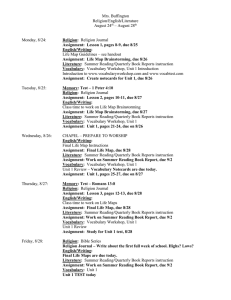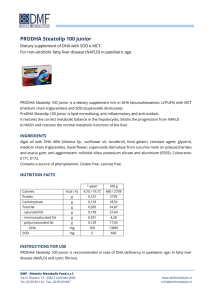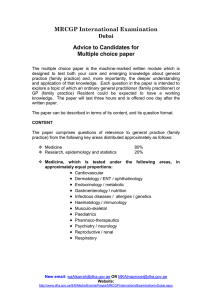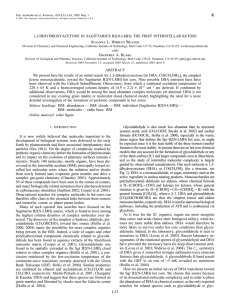Monthly Performance Reporting Template
advertisement
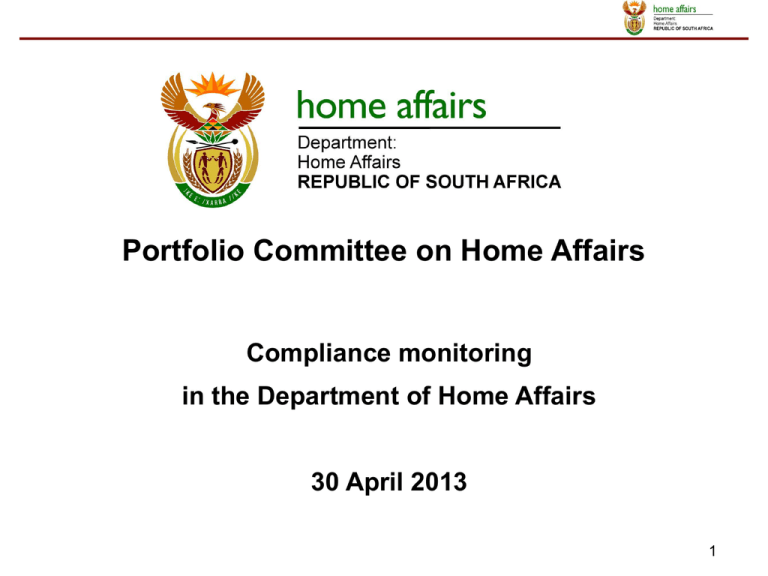
Portfolio Committee on Home Affairs Compliance monitoring in the Department of Home Affairs 30 April 2013 1 Content of the presentation • Compliance monitoring in the Department of Home Affairs • The vision, purpose and objectives of M & E in the Department • M & E Capacity • Internal M & E processes • Monitoring of Strategic and Annual Performance Plans • Types of reporting in the Department • Reporting at Quarterly Review meetings • Compliance monitoring tool for external reporting • Governance structures that receive performance reports 2 Compliance monitoring in the Department of Home Affairs • The monitoring of compliance is most importantly against the Treasury Guidelines on planning, financial management and reporting. The guidelines indicate or prescribe, amongst others: The planning, budgeting and reporting cycle and process; Standards for drafting targets and indicators and financial management; The structure and content of key documents (Strategic Plan. Annual Performance Plan (APP), Estimate of National Expenditure (ENE) and Annual Reports by which the DHA is held accountable. • The Department works closely with the Auditor Generals team to improve the level of compliance to key standards. 3 Performance monitoring: Response to audit findings Response to the 2011 – 2012 audit and input from the Portfolio Committee: Poorly formulated targets and indicators were improved through submitting an errata document. The auditors were asked to review targets and indicators in the 2012- 2013 Annual Performance Plan (APP) so any serious issues could be addressed. The auditors concluded that the targets and indicators would meet prescribed standards provided that the indicator description sheets dealt with the technical issues they raised. The Department plans to work closely the auditors to ensure that there is agreement on the nature and format of evidence they require for each target. 4 Monitoring and evaluation capacity in the Department • The Chief Directorate is situated in the office of the DirectorGeneral and includes Policy, Planning and M & E units. • Branches and provinces have persons (nodal points) who coordinate M&E as one of their duties. • Nodal points are briefed regularly and short courses on M & E have been provided that were also attended by managers. • An M & E road-show was taken to the provinces. • A project has been initiated to strengthen M & E functions. 5 Vision The vision of monitoring and evaluation: 1. To evaluate and communicate continuous performance so as to entrench a performance culture in the Department. 2. To monitor as to how effectively and efficiently the DHA executes its mandate to satisfy public demands (to achieve operational efficiencies by monitoring performance). 3. To evaluate impact of policy and strategy implementation. The purpose of Monitoring and Evaluation: 1. To provide information that will be used to analyse and manage strategic objectives and key operational areas; and to improve the performance of the organisation and individual business units. 2. To enhance accountability and transparency of DHA operations. 3. Provide accurate and reliable information to all the relevant stakeholders. 4. To enhance performance and evidence based budgeting , planning and policy development. 6 Objectives of M & E 1. To track and evaluate organisational performance across the whole organisation 2. To align the DHA M&E system with government initiatives 3. To monitor the cascading of policy and strategy to business and operational level and monitoring of the execution of strategy through various business levels 4. To align operational metrics to the DHA’s annual performance plans and ultimately to the over-arching strategy. 5. To provide management information to support external and internal purposes (including non regulatory reporting) 7 Monitoring of strategic plans • The planned strategic outputs are broken down into business and operational plans through the departmental planning process: 3 year Annual Performance Planning. • Managers are accountable for accurate and timeous reporting on the targets in their plans. • All managers (DDGs, chief directors and directors) therefore make internal arrangements in their areas of responsibility regarding the due date for monthly and quarterly reporting. • The norm is that all reports must be submitted to the M&E team on or before the 7th of every month and 10 working days subsequent to the end of a particular quarter. 8 Types of reporting in the Department Internal Monitoring • Mandatory internal reporting in DHA combines both the financial and nonfinancial performance information. Reports are be based on progress on achievement of targets set out in the APP. Monthly performance reports on Project plans including project expenditure should be submitted to the Steering Committee of a project. Expenditure reports are submitted to top management meetings and the external Audit Committee. Quarterly and Mid-year performance reports outlining progress on the APP quarterly targets are submitted to the M & E unit and discussed at Quarterly Review meetings and key management meetings. The Internal Audit unit monitors and reports on the implementation of audit recommendations. The Risk Management unit monitors the implementation of the Risk Action Plan 9 Types of reporting in the Department (continued) External Monitoring • Mandatory external reporting by DHA includes reporting to National Treasury, Presidency (Department of Performance Monitoring and Evaluation), Auditor General’s Office and Parliament Quarterly Performance Reports (financial) to the Minister and National Treasury; Mid-Year Performance Reports (consolidated from quarters) to the Minister on the APP targets and finances; and Annual Report (financial and non-financial) to the Minister, Parliament and Office of the Auditor-General focusing on the APP targets for the financial year. The DHA ensures that all quarterly reports are compiled and submitted to relevant stakeholders after the end of each quarter; as well as reports to the DPSA, PSC, DPME, various clusters and other bodies. 10 Reporting at Quarterly Review Meetings • The reporting programme has been aligned to the organizational structure of the Department. The emphasis of reporting is placed on core business with presentations from Civic Services (CS) and Immigration Services (IMS). Civic Services presents a consolidated presentation for the provinces in addition to a head office presentation. Core business is also be requested to identify key strategic and operational issues for discussion at the review. This will necessitate a meeting between the DDG and provincial managers beforehand. For other business units the emphasis is on support rendered to core business. The CFO always provides a report on financial management. Representatives of frontline staff attend quarterly reviews so that they can contribute to discussion of reasons for success or failure. All managers present are supposed to take information back to their staff. 11 Compliance monitoring tool for external reporting • Chief Directorate: Policy and Strategic Management developed a compliance monitoring tool (draft hardcopy available). It will be soon be implemented to track compliance with external reporting requirements. The reporting process: Reports to be categorised according to deadlines. DG will get weekly/monthly report on reporting requirements due in that particular month two/three weeks in advance depending on sign off delegation. Reports on compliance and the quality of reports to be discussed at ExCo. Business units compile and submit report to relevant external holders and copy to M&E to archive as a resource. 12 Key DHA governance structures that receive reports • Branch management meetings • Quarterly Performance Review meetings • Executive Committee (ExCo) meetings • Minister’s Management Meeting (MMM) • Department Management Meeting (CDs and up) • Audit Steering Committee meetings • External Audit Committee meetings 13 THANK YOU Questions? Comments? Suggestions? 14
